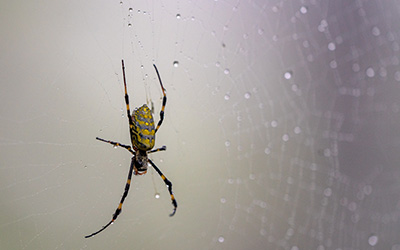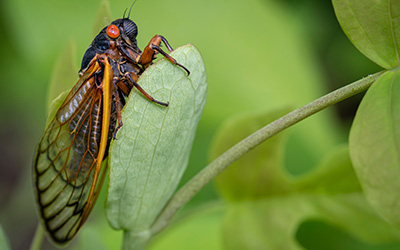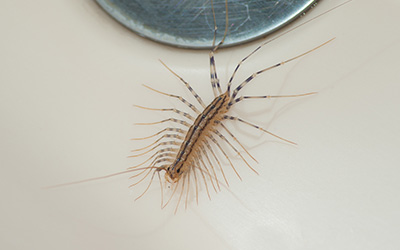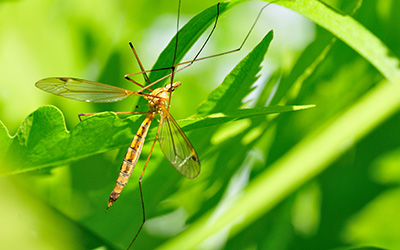Picture this: You’re enjoying a peaceful moment in your garden when, out of nowhere, you notice an enormous spider, its web spanning the space between two trees. This creature is far from the ordinary spider you might find lurking in the corners of your garden; it’s massive, imposing, and unlike anything you’ve ever encountered. Could it be the Joro Spider, a topic of recent news as it expands its territory across the eastern United States, now including Bristol and Johnson City?
Let’s dive into the details of this captivating species and address any concerns you might have. Read more to learn if spider extermination is needed.
What Does the Joro Spider Look Like?
The Joro Spider stands out not only for its size and the expansive webs it weaves but also for its striking appearance. Typically, a larger spider will be a female, thanks to the species’ sexual dimorphism, which means there are distinct differences in appearance between males and females.
Here’s how to tell male and female Joro spiders apart:
Female:
- Size: Large, with a body length of about 0.75-1 inch and a leg span of up to 4 inches.
- Color: Bright yellow and blue body with distinctive red markings.
- Web: Builds large, intricate webs that can span up to 10 feet.
Male:
- Size: Much smaller than females.
- Color: Features more muted tones and less conspicuous coloration.
- Web: Does not build webs as females do.
The webs produced by Joro Spiders are not only sizeable and golden but also exceptionally robust, effectively capturing a wide range of insects.
Where is the Joro Spider Found?
The Joro Spider’s adaptability to various environments has been increasingly observed. Initially believed to prefer large natural spaces, these spiders have shown a surprising tolerance for urban settings. Their proliferation near highways is particularly notable, given their reliance on web vibrations for hunting, a trait uncommon for spiders in such locales.
Their successful adaptation to both rural and urban settings suggests a potential for further expansion.
Is the Joro Spider Dangerous?
Despite their sizeable presence and somewhat intimidating appearance, Joro spiders are not considered a danger to humans. They might bite if provoked, but their fangs are relatively small, and they are generally inclined to avoid confrontation. The apprehension they generate is often greater than the actual threat, positioning them as more of an intrigue than a genuine concern.
Where Did the Joro Spider Come From?
Originating from East Asia, the Joro Spider is believed to have arrived in the U.S. unintentionally through shipping containers. This accidental introduction, starting near port areas, has led to their spread across the eastern United States.
The Future of the Joro Spider in Bristol and Johnson City
The arrival of the Joro Spider in Bristol and Johnson City might not be welcome news to everyone, particularly those with a fear of spiders. However, their ability to adapt and reproduce suggests that they are likely to become a permanent part of the local fauna.
Got Questions About Spiders?
While the initial discovery of a Joro Spider might spark fear due to its unfamiliar and imposing appearance, it’s vital to recognize their harmlessness towards humans. Their existence in Bristol and Johnson City reflects the dynamic nature of our ecosystems.
Should you have any worries or queries regarding the Joro Spider or other pests, don’t hesitate to reach out. We’re ready to provide guidance, information, or support for any pest-related concerns you might have.








